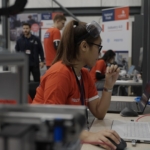Tuesday, 24 Sep 2019
Being globally connected is fundamental to a major nation’s development and outlook. It is why the UK, as the fifth largest economy in the world, invests so much in its membership of international institutions like the G7 – where the Prime Minister was in attendance last month – and the UN where he has been this week. As a member organisation of the WorldSkills network, comprising over 80 peer organisations from around the world, thinking globally is central to our own work at WorldSkills UK. It’s for this reason that we are particularly interested in a new survey from Pearson which gauges the opinions of over 10,000 learners worldwide. The Global Learner Survey findings are instructive to how we take forward learning and skills development here in the UK.
This survey underlines the importance of education to people’s development – over 80% of people across the world agree that education helps people live a better life. And when asked what type of education can best prepare people for their careers, the survey throws light on a question that has been increasingly raised in recent years about the value of higher education. A majority of UK respondents do not believe that university prepared them for their careers, with agreement into the 40s, percentage-wise, in each of the US, Canada, Australia and Europe. This tallies with WorldSkills UK’s own research with employers where only 3% said that a university degree would be important for future career success. In contrast, nearly 70% of respondents from all countries agree that a vocational qualification is more likely to enhance future career prospects.
This has to be seen as something of a watershed moment. There is a growing recognition, that the survey reflects, of the need more generally to take a pragmatic approach on the best way to get into and stay in work. This seems to be stronger in some countries more than others, and it’s for that reason that the survey points to a ‘global upskilling divide’. So whilst two-thirds of respondents in Brazil and China said that they had upskilled to keep pace with the changing nature of work, only a quarter of UK respondents said the same, with the figure not much higher than that in the US. Recent research on the attitudes of young people globally to technology and the future of work from WorldSkills and the OECD highlighted real challenges for the UK in helping prepare young people. However, we know that automation and the need to adapt to the increasing entry of technology into the workplace are not ones to which any economy, not least the UK’s, is immune. This fact being underlined by the recent BEIS Select Committee report, ‘Automation and the Future of Work’. It is clear that in the years ahead we are going to need to become a bit more like Brazil and China in our approach to the upskilling of the workforce.
That’s why learning from our international counterparts is the underpinning tenet of WorldSkills UK’s Productivity Lab programme. If we can bring back the array of global learning that we pick up from events like last month’s Skills Olympics and inject it into skills systems across England, Scotland, Wales and Northern Ireland, we believe we can produce better future outcomes for young people and their employers. We can certainly take a leaf out of the book of the Chinese and Brazilians. China is the number one global nation for success in the WorldSkills benchmark medal tables. This was no overnight sensation – but the result of years of planning and investment in training and assessment which forms part of a broader skills strategy to upgrade skills systems to keep up with economic change. Brazil is equally successful as a top performer and a key factor is their dedicated training centres as part of a broader strategy on achieving skills excellence.
With the technology and economic challenges we face, the UK is in need of a major skills upgrade. And we should be learning more from other leading skills nations. Given the talent of our young people and the know-how of the training experts in the WorldSkills UK network, we should be mainstreaming global best practice systematically into our skills systems to raise standards across the UK for more young people, their employers and the economy. Now is the time to take a long term view and act with investment in a centre of excellence through which to transfer knowledge and best practice to help UK skills systems reach the goal of being world-class.
It is essential that global experience continues to inform what we do across the UK. We welcome the fact that the Pearson survey points to so many positive trends across the world, not least the growing perception that technical education is becoming increasingly valued as a means through which to achieve your potential. And we should also learn from the findings and commit to deepening our understanding of the ways in which international economies are responding to the skills challenges they face. Innovations like our Productivity Lab will then allow us to take the next step: to put these learnings into action to boost young people’s opportunities to succeed and improve our economic competitiveness.


